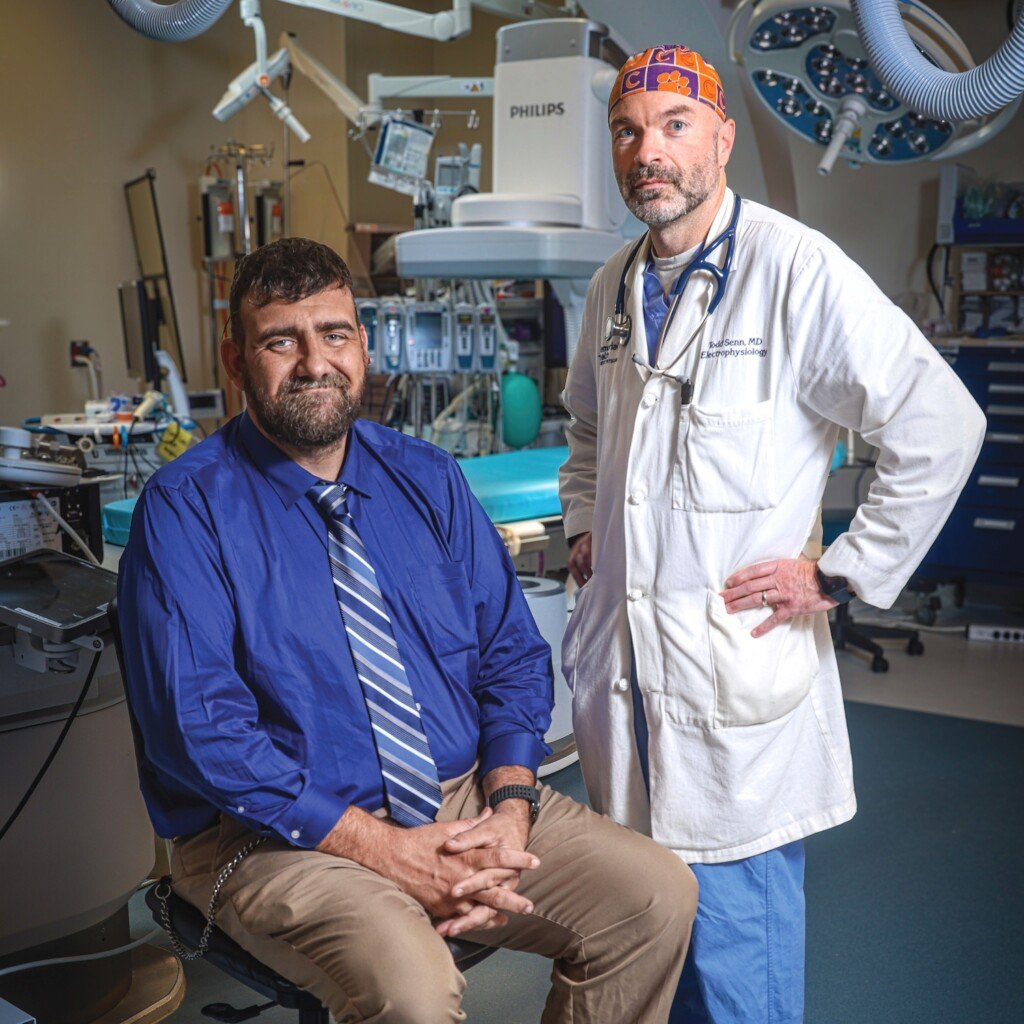A Mark of Pride
The Georgia Made branding program highlights manufacturing in communities statewide.
While grocery shopping, you may have seen – or even sought out – anything from peaches and peanuts to jams and jellies and more that bear the Georgia Grown label. And if you stay to watch the credits after a movie, you’ve likely noticed a big peach logo if the film was shot in Georgia. Now there’s a third label to call attention to Georgia’s thriving and diversified economy: Georgia Made.
Like Georgia Grown – the designation for food and agricultural products – Georgia Made is a branding program. But while Georgia Grown is a division of the Georgia Department of Agriculture, Georgia Made is managed by the Georgia Department of Economic Development (GDEcD). There are many similarities between the programs because the GDEcD worked closely with Georgia Grown teams to develop the Georgia Made program, says Lindsay Martin, who oversees Georgia Made in his role as the GDEcD director of entrepreneur and small business. The Georgia Film Office, also part of GDEcD, manages the program that features the peach logo in credits for films and other productions shot in the state.
The Georgia Made label may not be quite so visible to consumers, however, because it’s a brand for a manufacturing process. Poriferous, for example, a company which designs and manufactures surgical implants and earned the Georgia Made designation in February 2021, puts the logo on its exterior packaging rather than the implants. And Kia Georgia, which received the Georgia Made certification in February 2020, doesn’t stamp Georgia Made on the cars it produces at the company’s 2,200-acre facility in West Point.
Respect and Recognition
Bridgestone Golf in Newton County is an example of a Georgia Made company that is part of a much larger parent enterprise – in this case Bridgestone Americas. Bridgestone Golf earned its Georgia Made certification in April 2021 for start-to-finish manufacturing of premium-positioned golf balls. CEO Dan Murphy says when applying for the designation, the company benefited from its longtime presence in Georgia.
“Since we have been manufacturing in Covington since 1990, it was a fairly straightforward process for us. Over that time, we estimate we’ve manufactured over 100 million golf balls in the state, so our manufacturing credibility was well established,” he says.
The company, which also distributes golf items including bags, gloves and hats, employs about 160 people in production and management positions at its manufacturing and headquarters facility.
 “The Georgia Made designation has helped us achieve a level of respect and recognition right here in our home market,” says Murphy. That market is very good for Bridgestone, he says, and not just because of high-profile events such as the Masters in Augusta and the Tour Championship at East Lake in Atlanta. It’s also a good market because there are so many golfers in the state. “We’ve always wanted to be seen as Georgia’s hometown golf company and the Georgia Made designation helps us communicate our local roots,” Murphy says.
“The Georgia Made designation has helped us achieve a level of respect and recognition right here in our home market,” says Murphy. That market is very good for Bridgestone, he says, and not just because of high-profile events such as the Masters in Augusta and the Tour Championship at East Lake in Atlanta. It’s also a good market because there are so many golfers in the state. “We’ve always wanted to be seen as Georgia’s hometown golf company and the Georgia Made designation helps us communicate our local roots,” Murphy says.
The Georgia State Golf Association has 80,000 members and 350 member clubs. “The Georgia Made designation has helped us to communicate to the golfers in the area that they can tee up a Bridgestone and support the home team,” says Murphy.
Diverse Industries

Local Roots: Bridgestone Golf has been manufacturing golf balls in Covington since 1990. | Photo credit: contributed
The Georgia Made certification showcases goods and products manufactured statewide – and often exported worldwide. “Not everyone realizes how much manufacturing is happening across the state,” Martin says. The Georgia Association of Manufacturers (GAM) estimates that more than 9,000 manufacturing facilities employed more than 411,000 Georgians in 2022.

Strengthening Relationships: Lindsay Martin oversees Georgia Made in his role as director of entrepreneur and small business at the Georgia Department of Economic Development. | Photo credit: Kevin Garrett
Martin calls manufacturing “an economic engine for the state.” The diverse industry includes automotive, aviation, life sciences, defense, consumer and recreational sectors. Manufacturers account for 9.85% of the state’s gross domestic product, they employ 8.54% of the workforce, and manufacturing output exceeded $61 billion in 2019, according to the National Association of Manufacturers.
To qualify for the Georgia Made certification, applicants must demonstrate that at least 50% of the product is manufactured in Georgia. Raw materials can be sourced from outside the state. The GDEcD will ask the company to demonstrate that the product meets the program requirements. “That could include in-person verification in some cases,” says Martin. “Once all documents have been reviewed and verified, the company enters into the Georgia Made Licensing Agreement, and the product receives Georgia Made certification.”
So far, Martin says, more than 50 manufacturers have earned the designation for their products, with several more being considered for certification. The program even includes a system to certify food processing companies as Georgia Made companies. “By working with our local partners to identify companies that qualify for the Georgia Made label, we also strengthen the relationships that can help these businesses reach their goals more quickly and encourage their success,” he says.
Some companies use the designation as a marketing tool. Hurst Boiler and Welding Company in Coolidge, for example, proudly included the Georgia Made branding on a number of its products soon after it was certified in 2020.
Vibrant Business Community
Utah-based Purple Innovation Inc., a premium mattress company, has made itself at home in Georgia.

Surgical Implants: Poriferous Su-Por implants, like the ear-shaped one being held by this doctor, are primarily used for reconstructive surgery of the face and head. | Photo credit: contributed
In fact, the company considers the Peach State its second home. Purple opened its largest manufacturing facility – and the first outside of its home state – in McDonough in 2020. Since then, Purple has continued building on its original investment there by leasing an additional 300,000 square feet in 2021 and expanding pillow production.
So how does a Utah company get a Georgia Made designation?
“Because Georgia Made is a certification process for products, the process does not change between companies headquartered here and companies headquartered elsewhere. What we look at is where the manufacturing is being done, and at least 50% of that process must be done at a facility in Georgia,” says Martin.
Purple McDonough produces and distributes more than 2 million mattresses, pillows and cushions annually and operates out of more than 800,000 square feet of manufacturing and distribution space, according to Janis Greenspan, Purple’s vice president of brand and marketing strategy. In 2021, the Georgia Department of Economic Development awarded Purple McDonough, which employs about 800 Georgians, the Georgia Made certification.
Purple sells its products in more than 60 Purple stores and through some 3,000 retailers nationwide. “The McDonough location provides world-class service through shorter delivery times to those customers,” says DeMartini.
Enhancing Credibility
Aaron Noble, the CEO of Poriferous, says the Georgia Made designation has helped his company enhance visibility and credibility locally and in more than 50 countries where it distributes surgical implants primarily used for reconstruction of the face, head and ears.
“Georgia Made has been a catalyst in our journey, helping us to connect with new partners and opportunities and reinforcing our mission to be at the forefront of our industry,” says Noble.
He says a source of pride for the company’s 22 employees is that 100% of its products – 21,269 off-the-shelf pieces and 721 custom-made, patient-specific implants in 2022 – are manufactured at its Coweta County facility. Poriferous is a standout among Georgia Made companies, earning a Small Business ROCK STAR recognition from the state in 2022.
YKK is another global company that has earned the Georgia Made certification. One of the world’s leading zipper makers with headquarters in Japan, the company operates in 72 countries and regions and has a manufacturing fastening division plant in Macon.
YKK, which in addition to zippers, makes plastic hardware, car interior components and hook and loop fasteners in Macon, was among the first to receive the Georgia Made certification when the program began around 2020. “YKK has been ‘made in Georgia’ since 1974,” says Jim Reed, president of YKK Corporation of America.

Global and Local: Japanese zipper maker YKK has been manufacturing in Georgia for 50 years. | Photo credit: contributed
“[It] is a global company in scope but a local company in its soul. We do not make products overseas, then repackage them in Georgia for the U.S. market. We have been manufacturing locally for 50 years,” he says. “And we can boast multiple generations of employees making zippers in Georgia. ‘Made in Georgia’ helps us communicate the depth of our connection to the local community.”
YKK, which has 3.5 million square feet of manufacturing space in Georgia, employs approximately 1,500 Georgians statewide.
Economic Driver

Workers in the West Point plant; and the new KIA EV9, which is manufactured there. | Photos contributed
While it may not have been obvious when you bought it, if you drive a Kia Telluride, Sorento, Sportage or K5, your car is certified Georgia Made. In fact, all products made at the Korean automobile manufacturer’s 2,200-acre facility in West Point have that certification. Kia Georgia received the Georgia Made certification in February 2020. Many of the major component parts are also assembled locally. The company, which has an annual capacity of 350,000 vehicles, employs at least 3,000 people and has invested more than $1.9 billion in the West Point area.
“Kia Georgia is proud of our partnership with the state of Georgia and the agencies that make Georgia the No. 1 state for business year after year,” Stuart Countess, Kia Georgia president and CEO said in an email. He says the governor’s office, the Department of Economic Development, the Georgia Ports Authority, the Technical College System of Georgia and Georgia Quick Start have supported Kia since day one and continue to play a vital role as the company prepares to assemble its first electric vehicle in Georgia. Kia is in the process of completing a $200 million expansion at the West Point facility to allow for production of the all-electric 2024 EV9 SUV.
The dozens of companies that join the Georgia Made team vary widely in shape and size. Some have fewer than 25 employees. Others have more than 1,000. Despite their differences in size and product, though, all of them share a common desire to connect to the brand recognition of Georgia’s thriving business environment.
“Georgia Made, the Georgia film peach logo and Georgia Grown are all ways to increase awareness of how the work happening in Georgia touches people’s lives, from grocery stores to entertainment to your household goods,” says Martin. “As Georgia Made continues to expand, we want it to be as recognizable as the other two. We’re using those programs as guideposts for how to achieve the long-term vision our legislators and state leadership have for the [Georgia Made] program.”
The Georgia Made marketing also demonstrates the state’s commitment to the manufacturers. “From building a more personal connection to companies’ home markets to raising awareness of manufacturing’s footprint in the state,” says Martin, “Georgia Made is one way Georgia supports the vital manufacturing industry, which touches all four corners of the state.”









